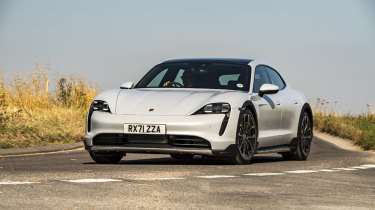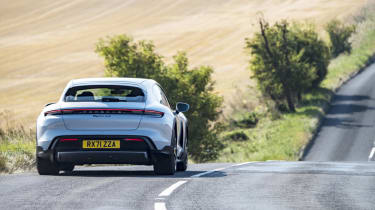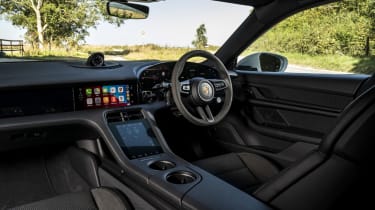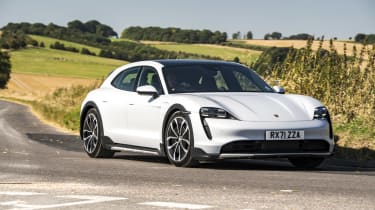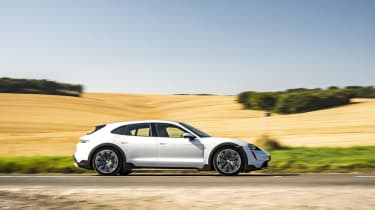Porsche Taycan Cross Turismo 2022 review – a sports utility vehicle done right
A convincing play at being the ultimate everyday driver of the future. It’s heavy and doesn’t have enough range, but there’s lots here to like
You could be forgiven for thinking that the Porsche Taycan Cross Turismo is evo’s worst nightmare. Not only is it a 2.3-ton electric vehicle, it’s also a rather unusual form of crossover, and let’s be honest, that particular genre has yielded some of the most pointlessly compromised and thoroughly vacuous vehicles ever to pass down a production line. The Vauxhall Adam Rocks. The BMW X6. It’s a rogues’ gallery, make no mistake.
The Taycan Cross Turismo is an entirely different proposition, however. You may have seen footage of it flamboyantly blasting along gravel tracks like a doomed prototype enduring destruction testing, but while it will indeed do that (at potential cost to the underside of the car if you’re brutal about it), this isn’t some jacked-up Taycan with phoney off-road pretensions. It may have plastic wheelarches and, yes, its default suspension setting is 20mm higher than a Taycan saloon’s (or 30mm with the off-road package that makes the default level ‘High’ and includes the extra sill cladding and winglets shown on this car), but it can also be lowered to somewhere between Low and Medium on a saloon. Got all that? Good.
Crucially, thanks to the fundamental packaging of electric vehicles of this kind, when you’re standing beside the Cross Turismo it feels every bit as low and lean as the Taycan saloon. The result is a car with massive presence – one that turns heads more than its maker’s sports cars. It is unmistakably a hyper-estate.
The Taycan is currently significantly reshaping Porsche’s business model. Consider that in the UK one in every three new Porsches sold is a Taycan, and that the Cross Turismo is already accounting for a third of Taycan sales. The Turbo model has a list price of £116,950, and that soon rises with a few options. Our Turbo test car is £141,687, for example. Sure, the development and infrastructure costs of bringing the Taycan to reality were astronomical, but the company accountants must be smiling every time a Taycan order rings through, especially one in this kind of spec.
More reviews
In-depth reviews
Review
Reviews
The Turbo sits above the 4 and 4S and below the Turbo S in the range. It offers the same power as the Turbo S in normal running at 616bhp, but whereas that figure rises to 671bhp in Launch Control mode for the Turbo, it goes to 750bhp in Turbo S. Similarly, there is up to 627lb ft of instant torque during launches in the Turbo, but 774lb ft in the S model.
Still, the Turbo clearly has some massive numbers attached to it (including a kerb weight of 2320kg) that then enable some very small figures, namely 3.3 seconds to 62mph from rest, and perhaps more impressively, less than two seconds to sprint from 50 to 75mph.
In terms of the car’s technology there’s enough to talk about to fill a dissertation, not just a straightforward first-drive piece. So I’ll bank on you already having an appreciation of the Taycan’s battery, charging and equipment story, and concentrate instead on how the car feels. Which is very comfy-cosy indeed from behind the wheel in its stylish cabin, a glance over the shoulder revealing that this particular car has the ‘4+1’ seating option, which, yes, you do have to pay extra for. Obviously. Despite this being such a large car the rear accomodation is still centred around comfort for two, with the middle pew a more occasional perch. And while the idea of the estate body promises a lot more space, the luggage capacity only rises by 39 litres with the rear seats in place, although there’s a useful 1170 litres in total with them folded.
Driving the Cross Turismo is a very interesting experience. It lopes along with a soothing ride quality, the optional 21-inch wheels only making their presence felt at very low speeds. Surrounded by acoustically insulated glass (that’ll be £1301), all is deeply serene, and in truth it’s a wonderful way to travel. The instantly available performance is absolutely immense, and leaves any other traffic standing, so much so that you soon realise the secret to driving the Cross Turismo is a healthy degree of circumspection with the right-hand pedal. Just because it’s there doesn’t mean you have to use it, however easy the performance is to access, and of course exercising restraint improves the vehicle’s endurance as well. (The Cross Turismo’s range is quoted as being 245-281 miles on the WLTP cycle, but once that figure drops below 100 the nerves can begin the jangle.)
Restraint is also required when enjoying the car’s dynamic ability. Make no mistake, it has plenty; given its size and weight it can hustle along with a rabid intensity that verges on the alarming, aided by unshakeable four-wheel-drive traction and freakish agility, boosted here by optional rear-wheel steering. It’s only when you enter a classic 90-degree B-road corner a little hot that the realisation of how much mass is rocketing along suddenly hits you – how big a hole in the scenery you’d punch if things really got out of hand. And because of its size and weight, and the rather two dimensional act of driving an electric vehicle – just two pedals, no engine sound, although there is a synthesised soundtrack – the Cross Turismo really needs the right roads if you’re actually to gain any of the ‘Thrill of Driving’ from it. On the lanes of the Home Counties driving it hard can all feel a bit reckless, and not that enjoyable.
However, this car’s greatest single flaw is one not of its making. It’s not Porsche’s fault that the charging network in the UK currently falls some way short of where it really needs to be. The spectre of range anxiety and the potential for driving out of your way to recharge, and waiting somewhere undesirable to do so, is distinctly unappealing to many, just as there are obviously those with a lifestyle where electric car useage fits comprehensively. These issues will surely be resolved in time. For now, it’s a Marmite proposition. That said, it shouldn’t take away from the fact that the Taycan Turbo Cross Turismo is a deeply desirable and convincing crossover. Now there’s a thing.
Prices and rivals
The Taycan Cross Turismo channels many Porsche attributes, and a reassuringly expensive list price is one of them. All Cross Turismo’s come as standard with a dual-motor setup, the basic 4 costing from £83,000. The more powerful 4S is a further £6500 at £89,500, while the Turbo starts at £118,500, and the flagship Turbo S rocks in at £141,000.
So far, no one else is doing a jacked-up estate crossover-style EV right now, but the all-electric SUV is a fast growing segment with all sorts of options. BMW’s iX is the most impressive of the current bunch, but is much more of a luxury cruiser than a sporty drive. Like the Taycan, it completely revolutionised the segment, with a fabulous interior, incredible refinement and cutting edge technology. Audi’s original E-tron SUV is falling behind in range and driving dynamics, and Jaguar’s I Pace drives well but is also feeling a little old fashioned; Merc’s EQC shouldn't bear mention.
It’d also be remiss to not mention the Tesla Model S, as in Plaid form it will likely undercut both Turbo models in price, but easily outperform it in a straight line. Unfortunately, the same can’t be said for when a corner approaches, with the chassis and braking systems not set up to handle the Plaid’s immense straight-line performance.

